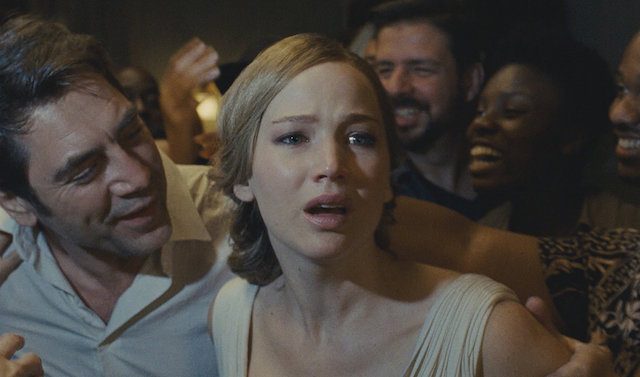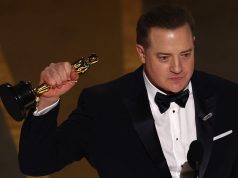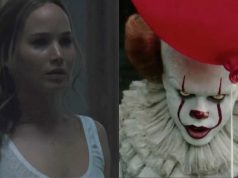“Mother!” is a strange film.
It is an allegory that carefully builds up until it can barely hold itself together and explodes with events and imagery that assault the senses. Director and writer Darren Aronofsky creates a film charged with meaning but his metaphor gets away from him halfway through the film and becomes a chaotic maelstrom, the exact opposite of its simpler, quieter first-half.
The film is polarizing, for sure, but there’s no question in the exemplary filmmaking techniques that Aronofsky employs and the magnificent performances of Jennifer Lawrence and Michelle Pfeiffer.
“Mother!” is the story of a married couple whose tranquil, peaceful life in what appears to be a country setting is disturbed by the arrival of a man and his wife. None of the characters are named, the first clue that this film is not to be taken literally. Invited to stay the night by her husband, played by Javier Bardem, the two guests (played by Ed Harris and Michelle Pfeiffer) start to intrude on the sanctity of the couple’s home.
There’s a lot in play in this film. Lawrence’s character is put upon by this intrusion, given permission by her husband, a writer who appreciates the disturbance despite his inability to write his next novel.
She is ignored, taken for granted, questioned, and even ridiculed by the guests. Her husband dotes on her but is insensitive to her discomfort. All of this is compounded by the fact that she’s rebuilding the house from scratch and the house is unfinished. And she’s also suffering from disorientation and maybe even hallucinations.
The film is relentless in inducing anxiety in every scene and putting on the pressure to Lawrence’s character. The camera never leaves her and Aronofsky insists on extremely tight shots of her face as she walks scene to scene from one area of the house to the next.
The claustrophobic use of the close-up enhances our empathy for Lawrence’s sense of loss of privacy. The house is huge but the close-ups never give us the feeling of space. In this situation, she has none.
Adding to that is the amazing sound design that enhances all the sounds of the house: creaking floorboards, footsteps, conversation from the next room, and even noisy plumbing. The house is in disarray and under construction and you can hear it. Something is about to break. It might as well be the wife and because of Lawrence’s fantastic portrayal, as viewer to all this, you are about to break as well.
But the film never relents. It continues on, increasing the stress levels with added disturbances until space and time are distorted and reality is torn apart. What began as a metaphor for privacy, the need for space, and social boundaries becomes even bigger as the film starts to reach for larger symbols to aspire to even larger meanings.
“Mother!” is a marvel of filmmaking. The camerawork and the sound design are so deliberate in their ability to hold on to you and make you feel what the protagonist is feeling, but where the film decides to go is matter of personal taste. It hints at a deeper meaning but it’s so overblown and so far from its starting point that it distracts you from its objective rather than focusing your attention on what is being symbolized.
The many different interpretations that “Mother!” has brought up from people who’ve seen it says a lot about how well the film is made. But the fact that there’s not one clear defining approach tells us that it overreached. It’s a shame because Lawrence and Pfeiffer give outstanding performances here and the first half is a splendid study in the disruption of boundaries.
They say less is more, and in the case of “Mother!” it just kept going for more and didn’t know when to stop.










